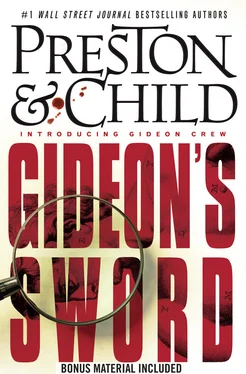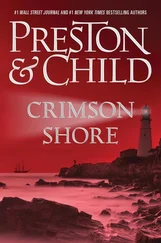There was a brief silence.
“Highest probability of success!” Garza exploded. “Was this part of your computer simulation? I told you from the very beginning not to trust this guy. What are we going to tell our client?”
Glinn looked from one to the other, not speaking. There was something not entirely dissatisfied in his expression.
The silence stretched on until, finally, Gideon rose. “If we’re finished here,” he said, “I’m going back to New Mexico to sleep for a week. Then I’m going fishing.”
Glinn shifted in his wheelchair and sighed. The withered hand reappeared from under the blanket shrouding his knees. It contained a brown-paper package. “Your payment.”
Gideon hesitated. “I figured you weren’t going to pay me. After what I did.”
“The fact is, based on what you’ve told me, our payment structure has changed.” Glinn opened the package envelope, counted out several banded bricks of hundreds. “Here is half of the hundred thousand.”
Gideon took it. Better than nothing, he thought.
Then, to his surprise, Glinn handed him the other half. “And here’s the rest. Not as payment for services rendered, however. More in the way of, shall we say, an advance.”
Gideon stuffed the money into his jacket pockets. “I don’t understand.”
“Before you go,” Glinn said, “I thought you might like to drop in on an old friend of yours who’s in town.”
“Thanks, but I’ve got a date with a cutthroat trout in Chihuahueños Creek.”
“Ah, but I was so hoping you’d have time to see your friend.”
“I don’t have any friends,” Gideon replied drily. “And if I did, I sure as hell wouldn’t be interested in ‘dropping in’ on them right now. As you pointed out, I’m living on borrowed time.”
“Reed Chalker is his name. I believe you worked with him?”
“We worked in the same Tech Area — that’s not the same as working with him. I haven’t seen the guy around Los Alamos in months.”
“Well, you’re about to see him now. The authorities are hoping you could have a little chat with him.”
“The authorities? A chat? What the hell’s this about?”
“At this moment Chalker’s got a hostage. Four of them, actually. A family in Queens. Held at gunpoint.”
Gideon felt this sink in. “Jesus. You sure it’s Chalker? The guy I knew was a typical Los Alamos geek, straight as an arrow, wouldn’t hurt a fly.”
“He’s raving. Paranoid. Out of his mind. You’re the only person nearby who knows him. The police are hoping you can calm him down, get him to release those hostages.”
Gideon didn’t reply.
“So I’m sorry to tell you, Dr. Crew, but that cutthroat trout is going to be enjoying life just a little bit longer. And now we really do need to go. That family can’t wait.”
Douglas Preston and Lincoln Child are coauthors of the bestselling novels Relic, Mount Dragon, Reliquary, Riptide, Thunderhead, The Ice Limit, The Cabinet of Curiosities, Still Life with Crows, Brimstone, Dance of Death, The Book of the Dead, The Wheel of Darkness, Cemetery Dance , and Fever Dream . Preston’s bestselling nonfiction book, The Monster of Florence , is being made into a major motion picture. His interests include horses, scuba diving, and skiing. He is the co-president of International Thriller Writers. Lincoln Child is a former book editor who has published four bestselling novels of his own, most recently Terminal Freeze . He is passionate about motorcycles, exotic parrots, and nineteenth-century English literature. The authors welcome e-mail from their readers; you can visit their website at www.prestonchild.com.
A Conversation with Douglas Preston and Lincoln Child
What is your process when writing as a team? Do you find writing together easier or harder than writing your solo books?
Lincoln: These days, we tend to divide the work, not by chapter or scene, but rather by a series of chapters from one character’s point of view, a plot sequence, or even an act. Then the other writing partner goes over that work and does a careful revision. The first one will take it back and revise further. And that’s why the books appear as seamless as they are. Of course, this is not always a fun process; sometimes I have to firmly object to Doug’s wholesale slashing of my deathless prose.
Douglas: Which is nothing compared to the manhandling Linc gives my lapidary work.
Lincoln: Regarding the writing process itself, we each have our own favorite kinds of chapters to write. I like to write chapters from the villain’s point of view.
Douglas: Twisted, evil chapters… He’s so good at that, sometimes I worry. I like to write scenes of action and obsessive pursuit — for example, the final chapters in The Book of the Dead where Constance is pursuing Diogenes.
Lincoln: As for the second part of the question, I think I speak for both of us when I say that the joint books are easier to write. There’s somebody you can always call on if you hit a dead end or if you need inspiration. Or if you just want to complain or commiserate.
Douglas: Having a partner helps you manage all the other odds and ends that go into being a novelist, as well. For example, we’re taking turns answering the questions in this very document.
What inspired this new series and character?
Douglas: Much as we love Pendergast, we thought it was time to shake things up a bit by inventing a new series character. We wanted to create someone who was totally different from Pendergast, clever, younger, and sketchier. We have a mortal fear of boring our readers — and ourselves.
Lincoln: We also were looking to write a series of novels that were shorter, faster-paced, with a lot more action, fewer subplots and less ratiocination. The Gideon Crew series was the answer to all that.
Gideon Crew is so different from Agent Pendergast. Did you purposefully write him that way?
Lincoln: Yes, we did. While we wanted Gideon to be as interesting and attractive — in his own way — as Pendergast, part of the idea of branching out into a new series was to create a character who was very much his own person. In some ways, Gideon is the polar opposite of Pendergast. Also, you might think of Gideon as our present to those readers who have been mourning the demise of Bill Smithback.
Douglas: Yes, there’s a wee bit of Smithback in Gideon, no doubt about that. As for Pendergast and Gideon, they’d be like oil and water. Their ways of dealing with people and getting what they want are totally different. Pendergast crushes people mentally and verbally and sometimes physically. Gideon tricks them, he fools them, he hoodwinks them. He is the king of the brave new art of social engineering.
Do you tend to model your characters after people in your own life?
Douglas: Not at all. In fact, for the most part, we avoid it.
Lincoln: Never. That’s a scary thought. We do, however, steal bits and pieces, mix and match — every novelist has to do that.
How did you learn so much about Hart Island? Why did you decide to use that as a location in this book?
Douglas: People ask if we do our own research and the answer is yes. Hart Island is a perfect example why. I was browsing the Wikipedia entry on potter’s field for a completely different reason and came across a mention of Hart Island, the largest public burial ground in the world. I was stunned to learn that, within the boundaries of New York City, there was an uninhabited island, of over 100 acres in extent, that is the final resting place for a million people. As I read on, I was captivated by the history of the island: it had been used as a sanatorium, a place of quarantine, and a Nike missile base, and for a boy’s workhouse, among other things. There was an entire town on the island, abandoned and falling apart now. Being a baseball fan, I was amazed to learn that some of the original bleachers from Ebbets Field had been moved there in 1960 and are still there, covered with vines and rotting away. It made the perfect setting for the book’s climax.
Читать дальше












